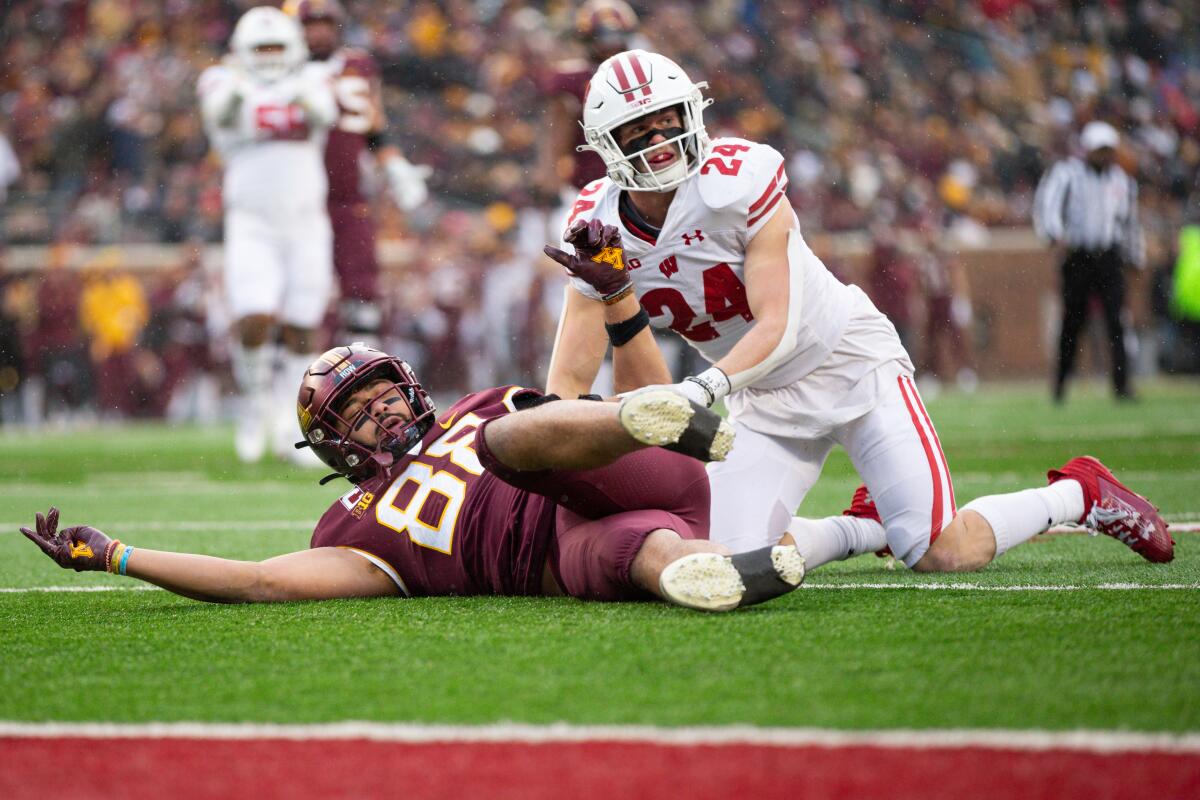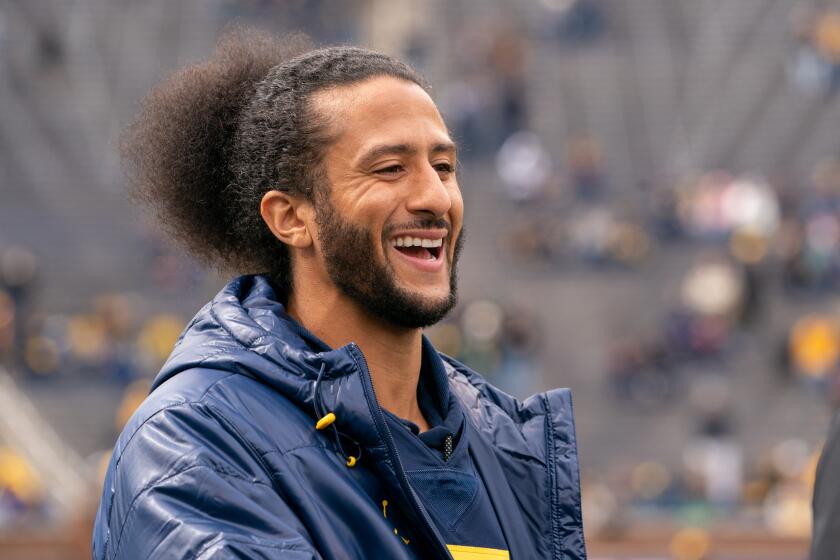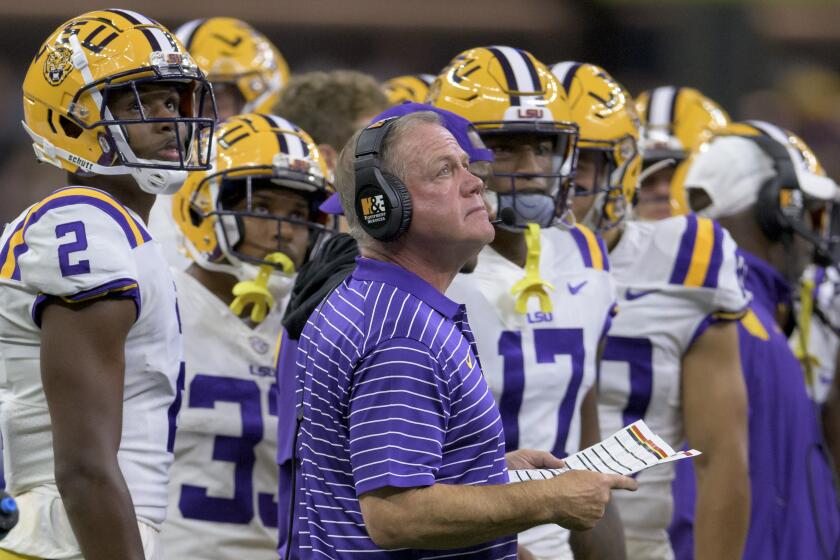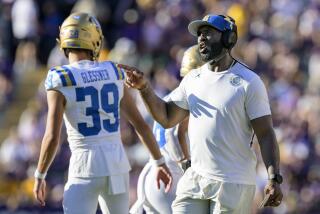Column: How do you get to an NCAA bowl game? Not just practice, practice, practice

- Share via
I was once the Grinch who hated when teams with losing records ended up making the postseason. All teams. All sports. All eras — even the ones I wasn’t around for.
In 1960, the year before arriving in Los Angeles, the 25-50 Minneapolis Lakers made the playoffs and swept the 30-45 Detroit Pistons in a first-round upset. To a Lakers fan like me, that should be a feel-good story. Instead my inner Grinch would hear this bit of history and wonder: What’s so special about one team with a losing record beating another?
But that was the old me.
Opinion Columnist
LZ Granderson
LZ Granderson writes about culture, politics, sports and navigating life in America.
I now have a heart for teams with sub-.500 records, and it’s all because of the 5-7 Minnesota Golden Gophers.
This college football team doesn’t really belong in the postseason. Not with that record. But the NCAA exchanged bowl merit for bowl money back in 2010, when it allowed 6-6 teams to be eligible. This made it possible to squeeze in more (meaningless yet profitable) games. Two years later, after further bowl expansion, the organization allowed teams with losing records to become eligible, if there weren’t enough winning teams to fill out the bowl games.
Basketball coach Dawn Staley is working with Goldman Sachs’ One Million Black Women initiative to raise awareness that the status quo is a problem for all.
This year only 79 teams won six or more games, and there are 82 bowl slots. To fill the vacancies, the NCAA invited two schools from lower divisions — James Madison and Jacksonville State — to go bowling with the big boys. Combined, they went 19-5 this season, so that makes some sense.
The Gophers, on the other hand … well, they made the cut because of good grades.
Why is he shunned? The country has changed since he protested police brutality in 2016. And the Rams could really use his help.
No kidding.
In 2003 the NCAA instituted a new scoring system designed to hold universities more accountable for the academic performance of student-athletes. That includes looking at graduation rates. Ohio State won the national championship sporting a rate of just 36% in 2003. The lowest rate in that postseason belonged to the Oklahoma Sooners. They won the Rose Bowl with a 26% rate.
This year’s Gophers may have ended the regular season on a three-game losing streak, but they still finished in the top 10 for academic performance. And of the five-win teams, Minnesota ranked No. 1, earning a bowl invitation.
The NBA has the G League to develop talent. MLB has triple-A baseball. Why doesn’t pro football pay for a minor league?
That’s why it doesn’t quite ring true to call the Gophers losers, despite their record on the field. For four consecutive seasons the school has finished above the NCAA academic average. An achievement worth recognizing. And there certainly is no need to be a purist about postseason eligibility when mediocrity is so profitable.
Look at Texas A&M, which is paying Jimbo Fisher $75 million to not coach football. That’s the cost of firing him two years after he signed a fully guaranteed 10-year, $95-million contract. According to Yahoo Sports, this year schools are on the hook for more than $120 million in buyouts. In 2021, universities spent a then-record $94 million on firings.
The added bowl games from recent years brought in additional revenue but apparently not scrutiny, as a number of athletic directors behaved as if they were using Monopoly money to hire coaches.
This is the same brain trust that argued against paying the players or letting them cash in on name-image-likeness deals.
The business was always paramount. For decades, college football emphasized the “athlete” of “student-athlete” and put money before merit.
The Gophers may have disappointed fans by losing seven of 12 regular-season games, but to the rest of us they’re now a feel-good story. Which bowl they end up in won’t be known until Sunday, but the one in Las Vegas is a possible destination. In a season in which tens of millions of dollars are going to coaches who didn’t win, why shouldn’t the Gophers get a season-ending bonus as well?
The program clearly emphasizes practice as well as studying. Minnesota has recently won five consecutive bowl games, a streak that began in 2015 with the Quick Lane Bowl, which was created the year before. And like this team, that Gophers squad also finished 5-7 and got in the postseason because of good grades.
The old me hated that giveaway postseason berth. But my tiny Grinch heart has started to grow.
More to Read
A cure for the common opinion
Get thought-provoking perspectives with our weekly newsletter.
You may occasionally receive promotional content from the Los Angeles Times.















